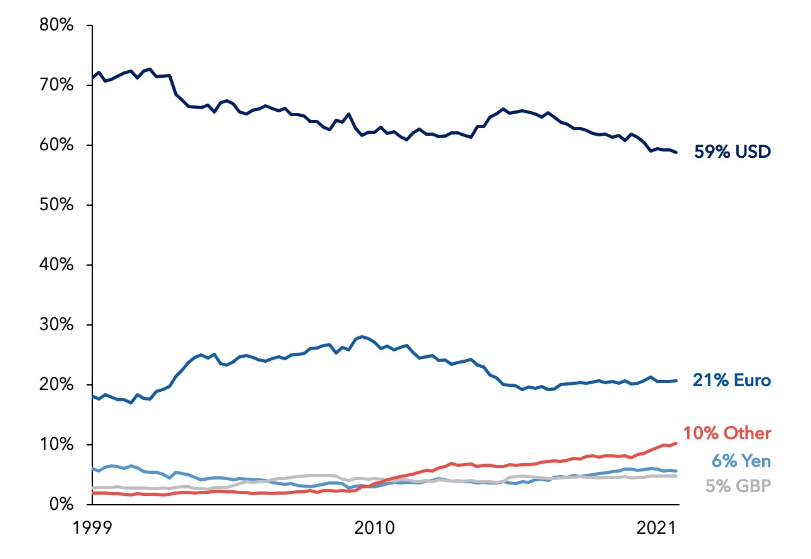It is an empirical fact that the United States dollar is continuing to lose its dominant role as the global reserve currency, but what might happen to the stablecoin market should it be superseded?
According to data from the International Monetary Fund, the U.S. dollar now accounts for just over 58% of global foreign exchange reserves, a considerable decrease from the 71% share it had in 2001.
Jeremy Allaire — the CEO of USD Coin (USDC) issuer Circle — highlighted this shift at the April 26 Consensus 2023 conference, arguing that the U.S. must implement stablecoin legislation and digitize the U.S. dollar to remain competitive amid the “very active de-dollarization taking place.”
De-dollarization refers to the process of reducing the use of the U.S. dollar in a country’s economy, and powerhouses like Russia and China are actively pursuing de-dollarization as they look to replace the U.S. dollar with digital assets, other fiat currencies, and potentially a BRICS currency between Brazil, Russia, India, China and South Africa.
As an example of this de-dollarization taking place, the Chinese yuan has recently overtaken the U.S. dollar as China’s most used cross-border currency according to Bloomberg, increasing to a high of 48% of transactions after it made up nearly 0% in 2010.
Chinese Yuan overtakes US dollar as most-used currency in China’s cross-border transactions for the first time in history.
Yuan-share rose to a record high of 48%, UP from nearly zero in 2010.
U.S-share declined to 47%, DOWN from 83% over the same period.
Wow. pic.twitter.com/Lm3Rygpm45
— Genevieve Roch-Decter, CFA (@GRDecter) April 26, 2023
Another example that may be more familiar to crypto users can be seen in El Salvador, which in 2021 became the first country in the world to use Bitcoin (BTC) as a legal tender.
Following news that crypto exchange Coinbase is launching a derivatives exchange in Bermuda, some crypto proponents such as venture capitalist David Sacks have even suggested that the U.S. may be attempting to prevent crypto firms from accessing bank services in the country in an intentional effort to drive them overseas out of fear that crypto could further eat into the dominance of the U.S. dollar.
Speaking to Cointelegraph, Dr. Joachim Schwerin — principal economist for the European Commission — suggested changes in the world’s leading reserve currency regularly occur, adding:
“Since we have…
Click Here to Read the Full Original Article at Cointelegraph.com News…
